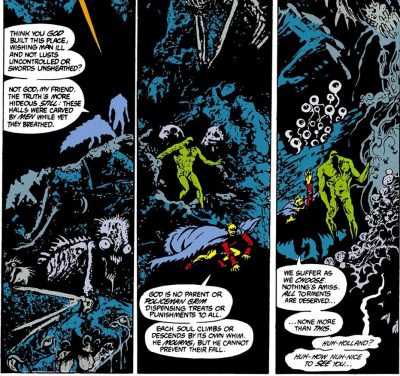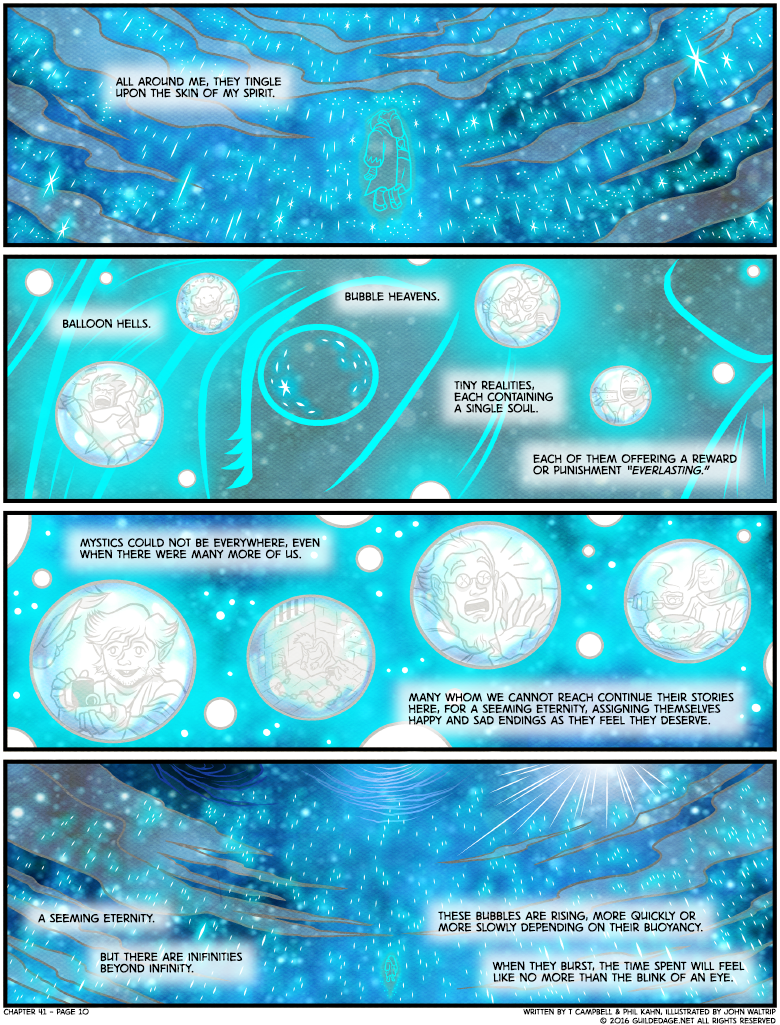Annotated 41-10
 Alan Moore, Neil Gaiman, and Mike Carey developed a vision of Hell in Saga of the Swamp Thing, Sandman, and Lucifer that hinges on the idea that people create their own hells. We are our own worst (or best?) torturers. Of course, many rotten people think they’re great and deserve all the comforts of life, and some good people think they’re terrible. But according to this theory, there’s some piece of them that knows the truth, and it’s that piece that’s given voice in creating their afterlife, whether they’re aware of it or not. So some of the damned still wail, “Why is this happening to me? I was a good person!,” but deep down, they know. Gravedust’s cosmology owes something to this approach.
Alan Moore, Neil Gaiman, and Mike Carey developed a vision of Hell in Saga of the Swamp Thing, Sandman, and Lucifer that hinges on the idea that people create their own hells. We are our own worst (or best?) torturers. Of course, many rotten people think they’re great and deserve all the comforts of life, and some good people think they’re terrible. But according to this theory, there’s some piece of them that knows the truth, and it’s that piece that’s given voice in creating their afterlife, whether they’re aware of it or not. So some of the damned still wail, “Why is this happening to me? I was a good person!,” but deep down, they know. Gravedust’s cosmology owes something to this approach.
A couple of the bubble hells that show violent deaths were also influenced by a Barry N. Malzberg short story. A man commits suicide, thinking it will save him from the living hell of constantly reliving his greatest sin. And it does, but he ends up constantly reliving his death instead: “The bullet bullet lodged deep deep in his brain he pulled pulled the trigger the bullet lodged lodged deep in his brain brain he he pulled pulled the trigger trigger the bullet”
Yes, Rabbit was sweet on Bandit, and in his personal heaven, he gets to propose to her (and she says yes, of course). Yes, Astoria Troy’s heaven has many joys, but there’s nothing like a good old piece of pie the way her hometown makes it. And here’s where we found out that Lectrus was definitely dead, and his fate was inspired by the old Twilight Zone story “Time Enough at Last,” in which the bookish survivor of a nuclear holocaust has collected a lifetime’s worth of reading material to entertain him, but breaks his glasses just before he can dive in.
Some readers thought the fourth large image was Ulak. He isn’t tagged, but he hadn’t yet been confirmed as surviving the Friggzerker fight. That’s not Ulak, it’s just some Cultist troll, but considering how Ulak’s story ends, it still ended up being a prophetic image.











“there’s some piece of them that knows the truth”
If true, that would make the Moore/Gaiman/Carey Grand Afterlife Theory sit better with me. In the more melodramatic forms of genre fiction, there are characters who go around muahahaing about how evil they are and that’s why they do evil things. However, in real life no one — except for some people with depression or the variant of OCD known as scrupulosity — actually believes themselves to be evil. Drug lords and human traffickers see what they do as satisfying market needs, as well as providing for themselves and their families. Dictators, and those who serve them, justify everything from their denial of civil liberties to acts of genocide as “for the good of our nation.” So I’m as skeptical of “everyone gets the afterlife they think they deserve” theology as I am of the more traditional “everyone gets the afterlife they deserve according to divine will” one.
If, however, it were true that deep down everyone knows objectively what they deserve, that would solve the problem of Nazis potentially going to Heaven and selfless (but depressed or otherwise mentally troubled) relief workers ending up in Hell. But that’s an awfully big “if.” Me, I prefer to assume that if there’s any form of posthumous existence at all (and to be frank, those of us still alive can’t know for certain there is or isn’t one), it isn’t a reward/punishment framework. To me that seems born of wishful thinking (understandable as it is). Plus, it makes the unwarranted leap of logic that if this life often isn’t fair, it must follow that the next life is 100% fair.
I like this about the Homestuck afterlife. It’s not a reward or punishment per se. It’s a purgatory of reliving past events and talking to alternate versions of people you knew (other ghosts) until your business is finished and you end. This can take a few minutes or decades.
It’s sort of horrifying yet also the most hopeful afterlife I’ve ever heard of.
Oh, hey Alice! Long time since the Lucifer boards. (damien/mindstalk)
Yeah, “some piece of them knows the truth” seems like an optimistic spin, not what I remember from Sandman or what I see in that snippet of Swamp Thing. So if you were self-confidently evil… well, maybe Heaven wouldn’t take you, if it has any standards, but you wouldn’t be trapped in Hell. And if you’re Edwin Paine, future Dead Boy Detective, you can spend 80 years in Hell as a murdered child because there was too much guilt in your upbringing.
(And if you said No to Dream of the Endless, in his rapey-Apollo aspect…)
Sandman did have other options: getting picked up by some little god, reincarnation, special deal from the Endless (not *always* bad…)
After reading T’s remarks and yours, I find myself cheering for a purgatory that is one very long extended therapy session where you go through everything you did, face all the ugly truths you kinda knew but denied, but also all the good things you did not dare enjoy. Both of these are hard, but of course there’s also everything you did well. Afterwards you’ll know what you have reason to be proud of and what not.
…and then, I’d like to get the chance to check for every single one of my choices whether my assumptions were correct, if I got them right, what that person was thinking in that moment, why X really did Y, what would have happened if I had … . It’d be cool to get to see how close I got to actually getting stuff right and being “good”.
Actually, after going through the therapy bit, I probably wouldn’t want to do that anymore because I can’t change anything in hindsight anyway, so it’d be really frustrating.
Actually, I think I’d prefer to do the reality check at several points in life, to inform the next stage. Too bad nobody offers that sort of thing :(
Think of it like this: “Treat others as you would want yourself to be treated” but they’re treating *themselves* as they would treat others.
A narcissist is incapable of treating others well.
In an afterlife of their own creation, how can they ever create something they would themselves find bearable?
With no-one else to steal from, with no-one else to put down, how can they escape the hell that is their own self?
I love this interpretation.
Best would have had the horriblest of times had he actually died instead of moving to Cyberia.
“However, in real life no one — except for some people with depression or the variant of OCD known as scrupulosity — actually believes themselves to be evil.”
People make this statement all the time, and I’m not really sure I buy it. Most people think their actions justified, but that doesn’t mean they don’t think them evil. Also, most people don’t view themselves as any one thing all the time. It feels like it’s too broad a statement to be true. No one? That seems unlikely.